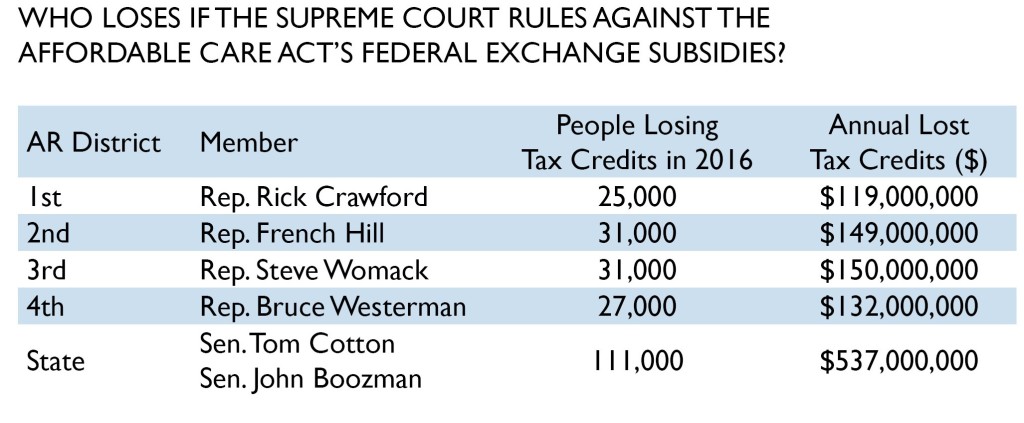
Arkansans could lose $537 million in tax credits for health plans purchased on the insurance marketplace based on the outcome of the upcoming Supreme Court decision in King v. Burwell. These tax credits lower the costs of health coverage purchased on the insurance marketplace to an affordable price for eligible individuals. Individuals with incomes between $16,104 and $46,680 per year are eligible to receive these subsidies. On average, the monthly premium for a marketplace plan in Arkansas was reduced from $387 to $94 with a tax subsidy, based on 2014 figures.
This controversial court case centers on a provision in the Affordable Care Act (ACA) that provides federal subsidies (tax credits) in exchanges or marketplaces. The ACA established federal and state level marketplaces that allow individuals to shop for private health insurance plans. States that have not established their own marketplace use the federal marketplace model by default. The law states that tax subsidies will only be available for policies purchased from “an exchange established by the state.” The plaintiffs (King) have argued that the correct interpretation of this law does not allow subsidies to be offered in federally-facilitated marketplaces. If the Supreme Court agrees with this line of reasoning, individuals in the 34 states with federal marketplaces would be denied federal tax subsidies (this includes state-partnership marketplaces and federally-facilitated marketplaces). However, consumers will not have to pay back their tax credits, regardless of the Supreme Court ruling.
Arkansas currently operates a state partnership marketplace, which means the state administers all of the consumer assistance activities, like licensing enrollment assisters, and the federal government is responsible for all of the other marketplace operations. If the Supreme Court decides in favor of King, the Congressional Budget Office (CBO) estimates that up to 111,000 Arkansans stand to lose federal health care tax credits. Subsidies allow thousands of Arkansans to purchase health care at a monthly cost that they can afford. Without subsides, many people will face real barriers to coverage and health care treatment. Individuals enrolled in the Private Option, Arkansas’s version of Medicaid expansion, will also not be affected by the Supreme Court decision since their monthly premiums are paid with Medicaid funds and not tax subsides.
Arkansas is in an interesting period of transition, making the King v. Burwell decision particularly important. The state is currently moving forward with plans to establish a state-based marketplace in accordance with legislation passed during the 2013 legislative session. However, new legislation passed during the 2015 session delays this transition pending the Supreme Court decision, which is expected in late June 2015. If the Supreme Court decides federally-facilitated marketplaces cannot offer subsidies, the Arkansas legislature will have to determine what model Arkansas will use for its marketplace in the future. The federally supported state marketplace open would offer Arkansas a viable alternative that allows consumers to keep receiving tax credits, while the state continues to build the infrastructure for a fully state-run marketplace. With limited alternatives for comprehensive, affordable coverage for children and families, this decision will have a critical impact on the health care system in Arkansas.Several states are preparing contingency plans that will allow individuals to continue to receive health care subsidies. Pennsylvania recently shared plans to possibly transition to using the federal technology, but the state would oversee all other aspects of the marketplace. This federally supported state marketplace model allows states to perform all of the marketplace functions with the exception of using the federal portal for enrollment (Healthcare.gov). Delaware has also submitted similar contingency plans, since 84 percent of individuals that have purchased marketplace plan in the state are receiving a subsidy.

